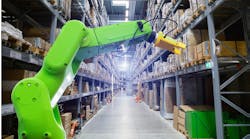Download this article in PDF format.
A global silicon chip crisis is making life difficult for automakers right now as they scramble to shore up their supply chains and get the materials they need to build their vehicles. In January, Ford announced that it would halt production at one of its German plants, the “latest sign that a global shortage of computer chips is putting carmakers under increasing pressure and threatening their recovery from the pandemic,” CNN reports.
The automaker idled its factory in Saarlouis, Germany through Feb. 19 due to the chip shortage and weak demand for its vehicles. CNN says the plant makes Ford’s most popular car in Europe (the Focus) and employs around 5,000 workers. Earlier in the month, Ford closed an SUV plant in Louisville due to the shortage of semiconductors.
“Leading semiconductor manufacturers reassigned capacity from automakers last year after the pandemic slashed car sales, instead shipping chips to companies that produce smartphones, gaming systems, and other tech gadgets that remained in high demand,” CNN reports. “Supplies are still tight, and carmakers are struggling to secure the chips they need.”
50 to 150 Chips Each
With the typical car requiring anywhere from 50 to 150 chips, automakers rely heavily on the semiconductor industry to supply them with the raw materials they need to be able to build driver assistance systems, navigation control components and emissions systems, among others. Currently, CNN says that—along with Ford—companies like Volkswagen, Fiat Chrysler, Toyota, Nissan and Honda are all feeling the pinch of the worldwide chip shortage.
In “Auto Production Disrupted By Chip Shortages,” NPR says Volkswagen was the first company to sound the alarm about the growing problem in December. “Now more automakers are reporting problems, including a Ford plant in Kentucky that shut down temporarily, a Jeep plant in Mexico that extended its holiday shutdown, and other factories that are trimming production plans based on their supply of semiconductors,” NPR reports.
The global pandemic is partly to blame for the shortage. When auto manufacturing was suspended in 2020 due to COVID-19, NPR says that the “global semiconductor industry planned accordingly, and arranged to sell more computer chips to other buyers.” When people started buying more new cars, plants resumed normal operations. As a result, demand for chips outpaced supply.
At the same time, demand for chips from the consumer electronics sector was also increasing. “Every school district in the country had to buy new computers,” the Center for Automotive Research’s Kristin Dziczek told NPR. “And the consumer electronics industry, as I understand it, pays a little better than the auto industry for these chips.”
Waiting Their Turn
In January, CNBC reported that the Taiwan Semiconductor Manufacturing Co. (TSMC) wants to prioritize production of auto chips, if possible. The world’s largest contract chipmaker, TSMC said at the time that current production capacity was “full,” but that it was looking at how it could possibly optimize production capacity. Germany has asked Taiwan to persuade Taiwanese manufacturers to help ease a shortage of semiconductor chips in the auto sector, CNBC adds, “which is hampering its fledgling economic recovery from the COVID-19 pandemic.”
Although chipmakers have faced capacity constraints before, Financial Times says industry analysts feel that the crunch is being made worse because the groups have little incentive to invest in extra capacity for the lower-margin chips used in laptops and televisions, and that have been in high demand during lockdowns.
“Instead, meeting demand for higher-margin chips critical for 5G networks, data centers, and the new gaming platforms launched by Sony and Microsoft late last year is far more attractive,” the publication adds.
Financial Times adds that even as more cracks emerge in chip supply chains, carmakers appear to have few options left but to wait their turn. “It is a question of fairness and equality. Everybody will get their share,” Nissan’s Ashwani Gupta told the publication. “Everybody is adjusting their productions but we will come out of it soon.”










